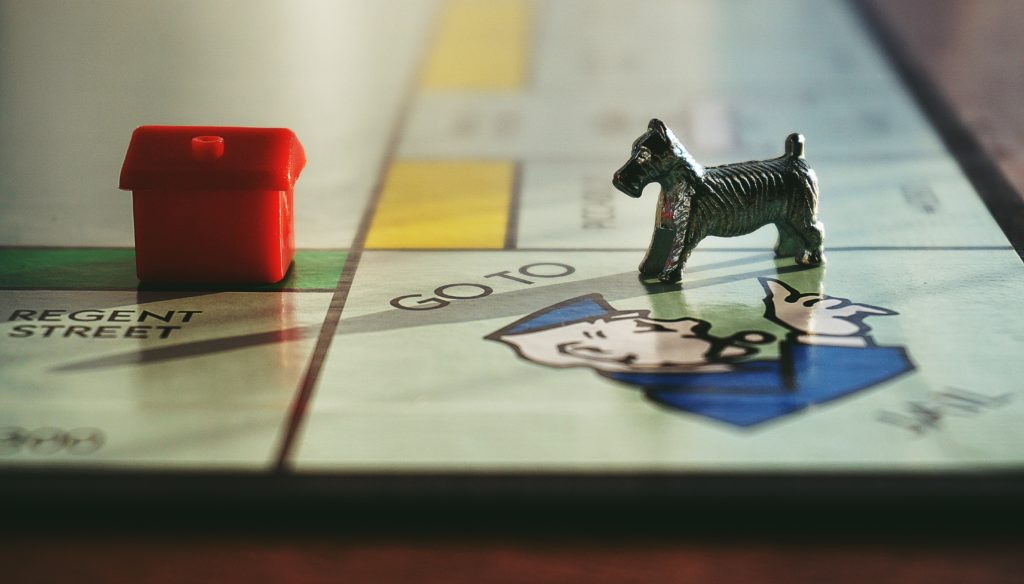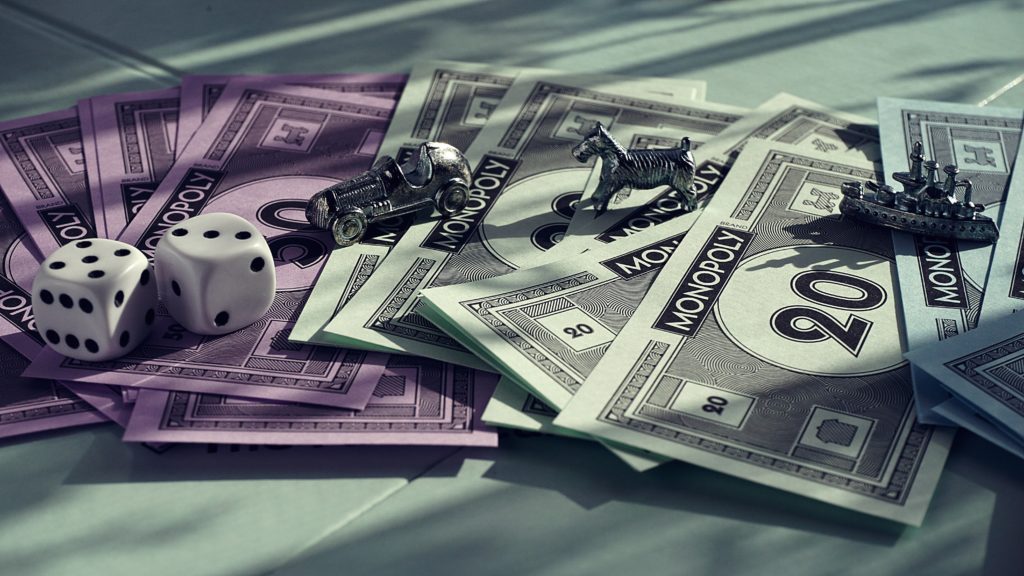Monopoly: it’s one of the oldest board games in the store. It’s one of the top 10 best-selling board games. There are over 1,144 versions of it on the Monopoly wiki. It’s also a terrible board game.
Oof. There’s a good chance I offended you with that last statement, but it’s important. Monopoly has a staggeringly low 4.4 out of 10 on BoardGameGeek. When board gamers need a game to mercilessly mock, they look no further than Monopoly.
Need help on your board game?
Looking for more resources to help you on your board game design journey?
Monopoly is a bad game, but have a little respect.
Yes, your ire toward Monopoly is well-placed, but put down the pitchforks. It played a role in history and we have a lot to thank it for. A world without Monopoly is a world without Scythe, Gloomhaven, Spirit Island, and Terraforming Mars. It’s the reason why modern board games don’t look like chess, checkers, backgammon, and Go.
The game was created initially by socialists to show why unchecked capitalism sucks. It’s easy to forget this. This game was never meant to blow up, it just did because it was in the right place in the right time. It also just so happened to make modern board gaming as we know it viable. So be kind, and say “thank you, next.”
Besides, when we – as gamers and game developers – put aside our frustration for a moment, we can actually see Monopoly for what it is: a solid concept with bad execution. There are a lot of questionable game design decisions that, if corrected, could have made for a fantastic game. In short, we can learn a lot of lessons from Monopoly.
1. Runaway leaders and family games are a bad mix.
Of the many issues that board games can have, runaway leaders are among the worst. Sure, there are some skill games where you want the ability to leave your opponents hopelessly behind in the dust, but those games are intellectual, challenging, and for a very specific and dedicated crowd who know what they’re getting into. That’s not how family games are meant to go!
There is some bitter truth behind the joking that Monopoly makes families fight. Once you start winning at Monopoly, you can buy more properties, charge more rent, buy more properties, and…you get the idea. Early on, if you get a bad chance card, land on the railroads, and hit luxury tax, you can end up with far less cash than your opponents and from the very beginning of the game feel like it’s hopeless. That’s an awful feeling.
The key takeaway here? If you’re making a family game longer than, say, thirty minutes, you need a way for losers to catch-up. This is a critical element of good game design.
2. Long games cannot rely heavily on luck.
A lot of ink has been spilled about how luck can be used in board games. Here’s the way I think of it: unless you are specifically making a board game where your objective is literally to push your luck, a la Quacks of Quedlinburg, then don’t have a major part of the game be determined by pure luck.
How do you implement luck without forcing events upon players? Well, perhaps different dice rolls can give players different options to choose from. Give players the option to hold onto randomly selected cards for later use at a convenient time. Things like this go a long way.
If you fail to do this, well, your game will play the players and not the other way around.

3. Pacing is important – the game needs to stay interesting for the entire time.
I think I said it best in 2016 when I first wrote about Monopoly:
Despite letting leaders run away and providing inadequate catch-up mechanics, Monopoly is not a fast game. In fact, it tends to drag on for an hour or more before the obvious leader finally claims victory. You can drag a game on by being the losing player who keeps landing – by random dice roll – on properties not owned by your opponent. This is not at all hard to do, especially considering that you keep getting $200 just for rolling the dice five or six times!
4. Think twice before you make a long game.
Okay, so it’s date night. You and your beau are trying to pick out a movie. It’s a little late, or maybe one of you had a long day at work. Perhaps one of you didn’t sleep well. Your choices are:
- A three-and-a-half-hour epic, complex, challenging movie like Lawrence of Arabia.
- Basic slightly-under-two-hours comedy.
We like to think we’d enjoy the first option, but we often default to the latter. It makes sense, too. Your gamers are busy. They’re tired. They’ve got stuff going on. Jobs. Kids. You name it.
If you want to make a long game, you have to make it a phenomenal experience. I’m talking about full-on Twilight Imperium or Gloomhaven. Even then, only a small fraction of people are up for an eight-hour board game.
Know your audience. Most people will start getting uncomfortable in their seats if a game goes over an hour. Most board gamers, even, will tolerate up to two hours.
One of the cardinal sins of Monopoly is that it often lasts three or more.
5. Keep the rules as simple as possible.
Business Insider ran an article in 2017 where they listed six ways people were playing Monopoly wrong. To save you a click, they were:
- Unnecessarily taking a lap before buying properties.
- Taking money when landing on Free Parking.
- Properties are not auctioned.
- Refusing to let players earn when they’re in jail.
- Giving players extra money for landing on Go.
- Giving properties back to the bank after losing.
Some of these misconceptions are generations of people misteaching the game. Yet if the game were not as complicated as it was to begin with, people wouldn’t feel the need to make up rules.
It’s not even that the rulebook is long! It’s just that the rules are unintuitive and feel wrong to people when they play the game. Good game designers will look for ways to eliminate “desire paths” in their game – places where people play the game in ways that aren’t intended. They then either change their game to curtail the behavior or clarify the rules.

6. Don’t use paper money.
This may sound like a small detail, but it’s really not. Paper money is bad news. It’s a relatively expensive material, and it’s not very satisfying. You have to fiddle with it and you can’t tell denominations apart without looking. Cardboard coins, wooden discs of different shapes, and poker chips are all better options.
Board gamers – even the really casual ones – interact with your game’s soul (it’s theme, rules, and so on) through its components. That means when your components are fiddly and annoying, so is your game!
7. Watch your playtesters’ reactions.
With so many issues, it seems unlikely that Monopoly was thoroughly playtested. At the very least, it wasn’t playtested to modern standards. So many of the flaws above can be observed and corrected. Aspiring designers should take note of the many flaws of Monopoly so they can avoid replicating them!
Final Thoughts About Monopoly
As deeply flawed as Monopoly is, the world is a better place because it exists. It helped paved the way for modern board gaming while providing a great case study in bad game design. The game’s frustrating legacy has indirectly made many, many board games much better.
Next time you encounter the latest version of Monopoly in Walmart, take a moment to smile at the game. Then walk past it without putting it in your cart 😛


2 thoughts on “7 Lessons from Monopoly for Aspiring Board Game Designers”
I have played a couple of the 100 versions of Monoply out there that tried to correct some of these flaws. The Lord of the rings version speed up the game by making the ring move around the board until it gets to the board walk space. Also the new Gamer/MARIO Kart versions are different and way more fun. That said, they don’t make it to the table nearly as much as other do they are fun enough.
I guess I am much older (75) than most of the writers here and much less knowledgeable in this field , but when I grew up in the 50’s and we didn’t have a computer, tablet, or cellphone to keep us busy, on rainy or snowy days my brothers and their friends or my friends and I kept busy with MONOPOLY marathons. SORRY and SCRABBLE ended too quickly , but MONOPOLY could go on for days. I had to learn to read when I was three so my brothers would let me play MONOPOLY with them. By the time we got to first grade we all new how to add and subtract even though there was no Sesame Street. Many children of immigrants, like me, were better prepared to go to school by MONOPOLY. As time went by I played Life and Sorry and Clue and Risk and Scrabble and Trivial Pursuit. But when I spend the Sabbath with my children and grandchildren and we don’t use electronics or drive the car, there is only one game they want to play….MONOPOLY. (I admit sometimes it is FROZEN OR MARIO MONOPOLY) but it is still MONOPOLY. Say what you what but when you have a long afternoon or evening ahead of you, the answer is always MONOPOLY.